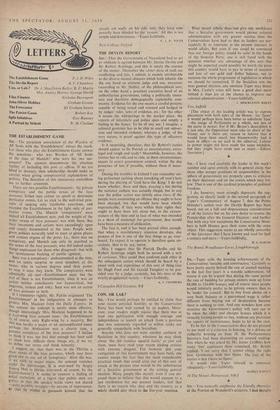THE DEVLIN REPORT
SIR,—That the Government of Nyasaland had to act or abdicate is agreed between Mr. Justice Devlin and Sir Robert Armitage, and this is surely the essence of the matter. Thereafter the °biter dicta of each are conflicting and this. I submit, is mainly attributable to the diverse mental climates which both inhabit. On the one hand an eminent judge and one, moreover (according to Mr. Hollis), of the philosophical sort; on the other hand a practical executive head of an authoritarian government, ruling a politically imma- ture and therefore demagogically exploitable com- munity. Evidence for the one means a careful process, capable of being tested and retested and hedged in by judges' rules, laws of evidence, etc.; for the other it means the whisperings in the market place, the reports of informers and police spies and simply a feeling in the bones. To be Of any use, I imagine, a colonial governor has to be able to smell out subver- sion and intended violence, whereas a judge, of his very nature, is proof against this type of olfactory evidence.
Is it surprising, therefore, that Sir Robert's tactics should appear to Sir Patrick as unsatisfactory, extra- legal and rough and ready? Meanwhile, however, the former has to rule and to rule, in these circumstances, means to assert government control, within the due processes of law if possible, without them if neces- sary.
During the troubles in Ireland I can remember see ing policemen rushing about knocking off men's hats during the playing of 'God Save the King.' I do not know whether, there and then, wearing a hat during the national anthem was actually illegal, but in any case the police action was strictly ultra tires. If the people were committing an offence they ought to have been charged, but that would have been wholly impracticable; if they were within their rights they ought to have been left alone but, in the circum- stances of the time and in face of what was intended as a show of contempt for government, that .would have been a measure of abdication.
The fact is, and it has been proved often enough, that when a revolutionary situation develops, due process of law is one of the first things to go over- board. To expect it to operate is therefore quite un- realistic, that is to say, naïve.
May I suggest that Sir Patrick Devlin and Sir Robert Armitage might both be served with a writ of certiorari. They could then confront each other in the subsequent action which should be heard by a panel with real experience of this sort of thing (say Sir Hugh Foot and Sir. Gerald Templer) to be pre- sided over by a judge, certainly, but this time of the strictly pragmatical variety.=Yours faithfully,


































 Previous page
Previous page